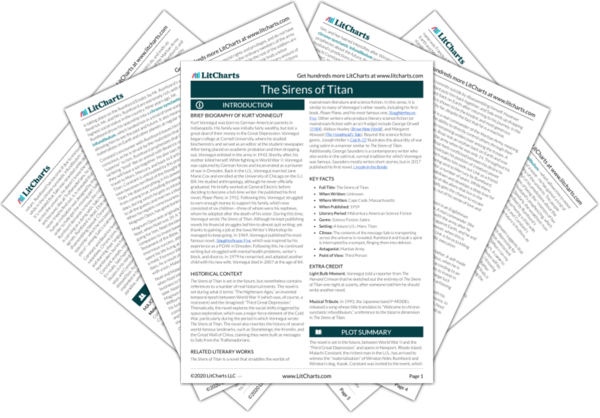Soldiers in the Martian army are all fitted with antennae, which force them to remain under the army’s total control. The antennae thus represent lack of free will and the question of whether it is possible to override external control. When Malachi Constant is abducted, brainwashed, and given the new name and identity of Unk, he is also fitted with an antenna. Like the other soldiers, whenever Unk thinks or does something “that a good soldier wouldn’t do,” the antenna causes him pain. The fact that everyone in the army (including the generals and doctors) wear the antennae is presented as proof that the Martian army is “democratic.” Yet the real leaders of the army, including Boaz—who are hidden among the population of soldiers—do not have antennae. The antennae thus represent the potential of technology to control people in terrifyingly absolute and hidden ways. Unlike a traditional army, with a less direct and sophisticated system of disciplinary techniques, the Martian army has absolute control over its members’ thoughts, speech, and bodily movements. In this way, the antennae relate to the novel’s exploration of free will. Obviously, the Martian army are externally controlled in a much more obvious way than ordinary people. But if free will is an illusion, it could perhaps be argued that every person has a kind of metaphorical antennae controlling their actions—albeit one they cannot see or feel. This raises questions about the possibility of disobeying the antenna. Indeed, once Unk finds the letters he’s been writing to himself, he begins to disobey the antenna, ignoring the pain and even coming to crave it as a sign that he is gaining greater understanding of the situation he is in. Ultimately, Unk is able to disobey his antenna, suggesting that freeing oneself from external control is possible, but painful. At the same time, Unk isn’t able to deviate from Rumfoord’s prophecy for his life, ultimately leaving it ambiguous as to whether it is possible to exercise free will.
Antennae Quotes in The Sirens of Titan
At the hospital they even had to explain to Unk that there was a radio antenna under the crown of his skull, and that it would hurt him whenever he did something a good soldier wouldn’t ever do. The antenna also would give him orders and furnish drum music to march to. They said that not just Unk but everybody had an antenna like that—doctors and nurses and four-star generals included. It was a very democratic army, they said.

Unlock explanations and citation info for this and every other The Sirens of Titan quote.
Plus so much more...
Get LitCharts A+As free as it wanted to be—that’s how free the free will of Boaz was.
(71.) Unk, old friend—almost everything I know for sure has come from fighting the pain from my antenna […] Whenever I start to turn my head and look at something, and the pain comes, I keep turning my head anyway, because I know I am going to see something I’m not supposed to see. Whenever I ask a question, and the pain comes, I know I have asked a really good question […] The more pain I train myself to stand, the more I learn. You are afraid of the pain now, Unk, but you won’t learn anything if you don’t invite the pain. And the more you learn, the gladder you will be to stand the pain.
“Luck, good or bad,” said Rumfoord up in his treetop, is not the hand of God.”
“Luck,” said Rumfoord up in his treetop, is the way the wind swirls and the dust settles eons after God has passed by.”












